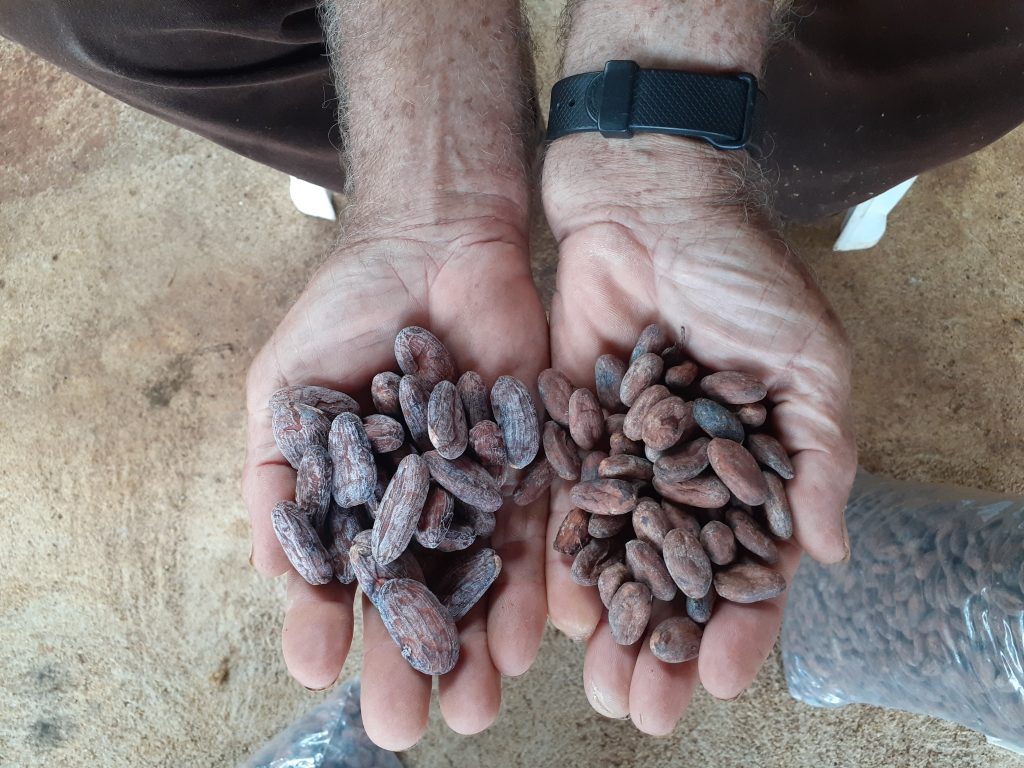The 2030 Cocoa Project, conducted by the Institute for Forest and Agricultural Management and Certification (Imaflora) in partnership with CocoaAction Brasil and supported by Fundo Vale as part of its strategy to strengthen sustainable production chains, is training technicians in agroforestry systems featuring cocoa.

In 2023, Imaflora carried out training to encourage sustainable production systems and help implement a demonstration site in partnership with Ideflor-Bio. So far, three meetings have been held for technicians from EMATER-PA, SENAR-PA, cooperatives, Belterra Agroflorestal, NGOs and freelancers: the first on post-harvesting, held in Altamira, Pará, in April, for 20 participants; the second on efficient cocoa nurseries and seedling production, also in Altamira, in June, for 30 technicians; and the third on pruning grafted and hybrid cocoa, held in Medicilândia, Pará, for 36 technicians.
The promotion of decent work, increased efficiency and productivity, and the strengthening of knowledge, technical assistance and rural extension activities are broad themes of the 2030 Cocoa Project – a public-private initiative in the cocoa sector, led by CocoaAction and the World Cocoa Foundation. The goal is to accelerate the sustainable development of the cocoa production chain, focusing on positive impacts on the countryside. Fundo Vale is one of the supporters of the project, which through collective work and collaboration among multiple partners aims to structure this chain to overcome bottlenecks, with actions aimed at producers, cooperatives and technicians.
“The training strategy focusing on field technicians aims to reach as many producers as possible, given that one technician in the region can serve up to 100 producers. Thus, we believe that using the knowledge generated, applied and taught by specialists in these topics, the technicians will be able to pass on the knowledge to the producers for their day-to-day activities. In this way, the cocoa production chain will be continuously impacted in different locations,” says Vitor França, Imaflora’s projects and services coordinator and the coordinator of the 2030 Cocoa Project.
In the field of research, Fundo Vale works in an integrated manner with the Vale Institute of Technology (ITV), and they have already developed and applied a productive and land use socioeconomic diagnosis in three municipalities in Pará. The same methodology was used by Imaflora in training sessions with cocoa producers to capture information on new technologies for strengthening the value chain. In this area, any need related to research into sustainable cocoa production is addressed through training by Imaflora, making a connection between the knowledge generated or researched by ITV and the contribution or participation of the producers, who are the ones working on the front line.
“Fundo Vale’s action strategy always brings together a group of organizations that are important to the ecosystem. Here in the cocoa chain, we seek to involve producers, researchers, representative organizations and the public sector in order to promote integration and collaboration in the sector. CocoaAction Brasil works with the private sector and big chocolate companies, Ideflor-Bio represents the public sector, Imaflora is a catalyst organization working at the cutting edge with producers, and Impacto works to promote fair labor conditions. In a cross-cutting way, liaising with stakeholders, Fundo Vale financially supports and contributes to the management, planning and implementation of these initiatives,” explains Liz Larcerda, Fundo Vale’s partnerships analyst.
A training session regarding a document called the Manual for Implementing the Cocoa Sustainability Curriculum was also held in September 2023 for more than 80 participants in 4 different municipalities (Novo Repartimento, Marabá, Parauapebas and São Félix do Xingu), under the responsibility of Imaflora.
“We support initiatives that seek to strengthen knowledge and encourage sustainable production systems, not only in the impact businesses that we directly support as part of Vale’s 2030 Forest Goal but also in other locations and/or projects. In this way, we believe we will be able to leverage and foster the agenda throughout the region and thereby show that it is possible to link the management of agroforestry businesses to systems that contribute to ecosystem services (food production together with soil, water and biodiversity conservation, while also helping tackle the climate crisis),” says Bia Marchiori, an agronomist at Fundo Vale.
The aim of this training is to support producers and technicians involved in the cocoa chain, expanding opportunities for local families, promoting financial independence and generating income for local communities.
